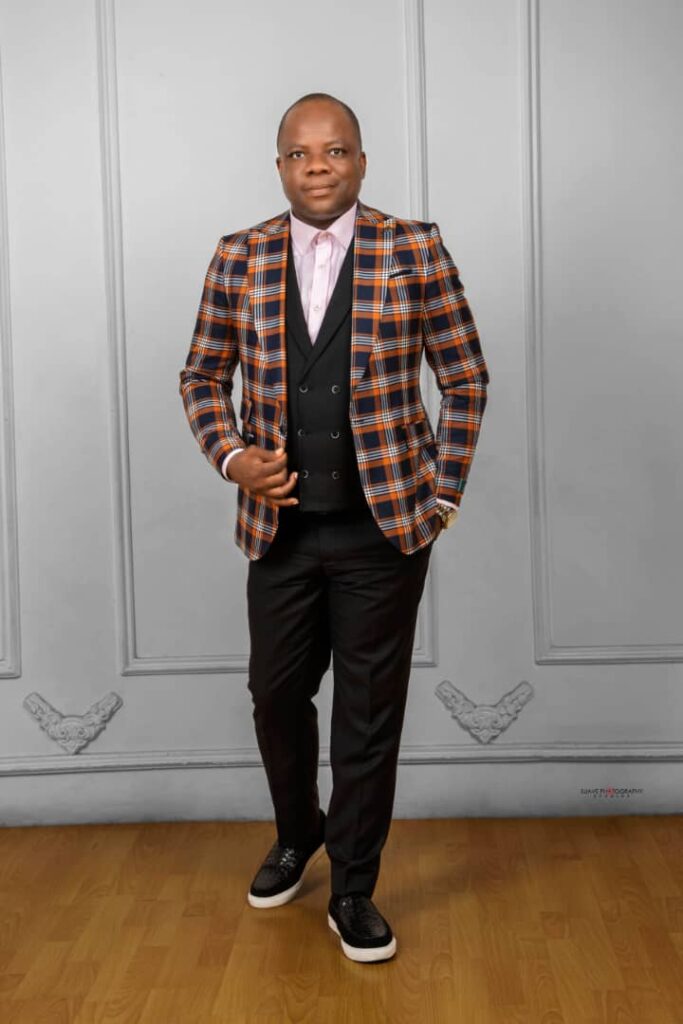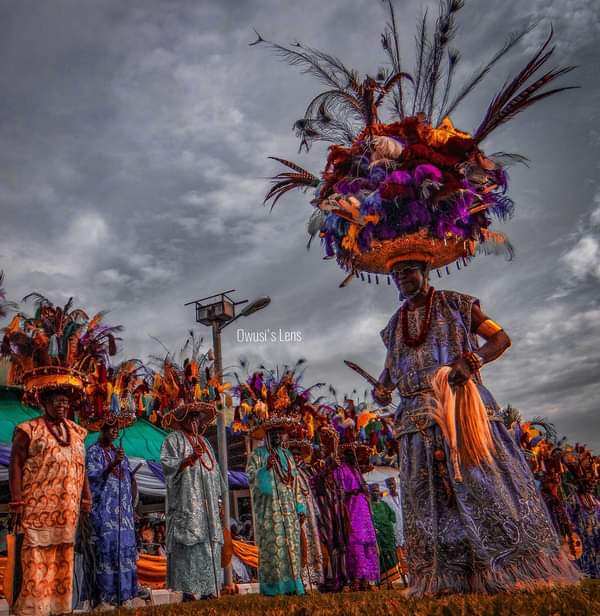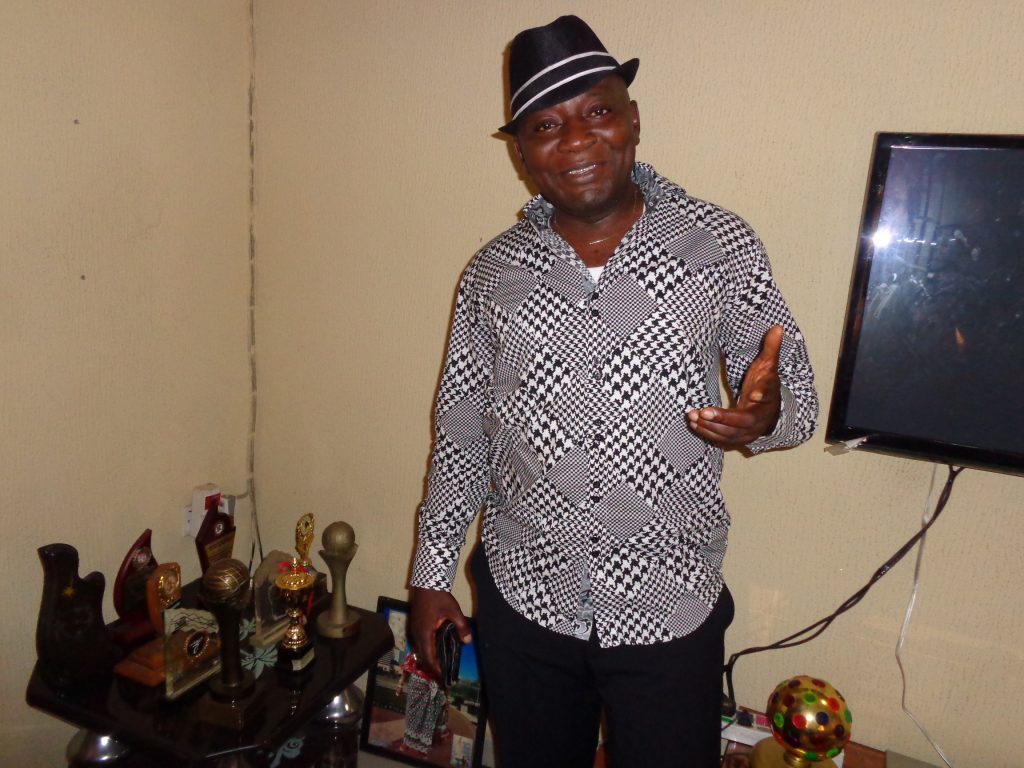
Ikem Mazeli, known as Material, Onye nwegwu is an award-winning traditional highlife musician and a political stalwart in Anambra State. Recently, he traveled to faraway Dublin to ply his trade. In this sizzling interview with Okey Obiozo, he reveals how it all started, his inspiration, passion, culture and plans for his music.
Let us meet you
My name is Honourable Ikem Mazeli, known as Material, Onye Nwegwu. The honourable that is attached to my name is because I was once a supervisor for Works and later, Education in Onitsha-North Local Government Area. I am a politician cum musician.
How was your growing up?
My growing up was modest because right from childhood, I have been focused in life, knowing quite well that I was from a poor background, therefore I had to focus on working extra hard to forge ahead in life and ultimately aim at upgrading my family’s status.
Thank God, today such dream has been achieved and I have put my family’s name in the fore-front through my music. That notwithstanding, there were some hitches along the line but being focused helped tremendously in charting the right course.
…your educational background?
I had my primary education at Nwora Umunna Memorial Primary School, Onitsha, and proceeded to Washington Memorial Grammar School, Onitsha for my secondary education. My higher education was at Edo State University, now Ambrose Ali University, Ekpoma, Edo State for a Bachelor of Science Degree in Political Science.
I had a post graduate degree in Business Management at Nnamdi Azikiwe University, Awka, Anambra State.
How did you venture into music?
I had been into music right from my tender age. I started from cultural music. As a kid, I used to be the lead dancer for Ncheta Ka Cultural Group. Interestingly, wherever we performed, I used to entertain the crowd. It was from there that I graduated into being a flutist, specializing in the local flute called, Oja.
Later, I was attached to Nkolika Cultural Group as their flutist. I still play flute professionally till date but my singing career actually started from the gospel band.
While in secondary school, I joined Anglican Youth Fellowship (AYF) Band of Emmanuel Church. It was during my membership of that gospel band that I discovered and nurtured my singing talent. In the process, I became the band’s lead vocalist and we eventually released two gospel albums that were hits and commercial success in the early 1990s; Ocho Mma and Asi n’arum abulu s’onu.
What happened from there?i
Along the line, during 1994 some Onitsha talented musicians and I came together to form Onitsha-Ado Youths Band. The group consisted of; Ifekandu Onwuatu, Ejiofor Ayadiuno, Amechi Egbuna, Sunday Jamike and my humble self.
Though band started purely as a gospel band and flourished but we diversified into fusing gospel music and circular highlife, dishing out varieties of music at social functions and before long it became the toast of the town.
While in Onitsha-Ado Youths Band, we released Niru Niru K’anyi gaga as a joint effort and played together as a group till 2001 when the group split and I went solo after my graduation from the university in 1998. My decision to play music professionally motivated me to go solo so as to stand the test of time.
It was afterwards that I established my band; Ikem Mazeli and His Material Band and started releasings my songs as individual effort. Discovering that I could play music professionally even as a graduate and getting to know that music is lucrative was a huge motivation to me. I realised that for me to churn out the type of play music I want, I need to go solo and that was it.
Playing as a group however never gave me the opportunity to grow musically because of other views to be considered before things are done but as a solo artiste, minimal interference is made during decision making and it allows for creativity. Also, I decided to go solo in order to make decisions that are supposed to help me in the music industry.
When I went solo, I decided to choose a genre, meanwhile, as a university student, I met Victor Uwaifo who is my role model and a big influence on my style, I discovered that he plays traditional highlife music. Seeing that the older generations of highlife musicians are gradually fading, I observed the need for the younger generation to step in and carry on, so I decided to play traditional highlife music to keep it alive.
How did you start?
Firstly, I started by playing copyrights but along the line; I grew into creating my own kind of music. Today, I play my personal composition; I write and perform my own songs.
As a professional traditional highlife musician, I see myself as a philosopher. You observe things that happen in life and nurture the ability to compile them into songs for people’s learning and entertainment. So, I started by researching into what happens in life within my domain and use it in my lyrics to teach people life’s lessons from the standpoint of others’ experiences.
Also, as a traditional highlife musician, we use our music to pass across relevant messages. We use music to expose things that happens around people which they don’t take into cognizance.
Through music one can pass across messages on how best to do things or handle situations and people.
How have you fared in this regard?
There is an age long perception that musicians are loafers in life, I have used my experience largely to change that perception. I have made effort in changing the way people see musicians because music is lucrative.
As a role model, I have been able to motivate the younger ones into charting career in music because as a graduate, I am a professional musician.
Gone are the days when parents discourage their children from music, preferring they face their studies. Nowadays, people’s ideas of musicians have changed, parents can now easily invest in their children who are interested in music, and some even buy them instruments as a means of encouragement.
Just like in the days when children were discouraged from playing football or engaging in any sporting activity or music professionally because the practitioners were considered to be failures in life but nowadays, things have changed and I’m glad to be instrumental in changing that perception within our locality.
Where do you draw your inspiration?
Once the creativity is there, songs ideas could come at anytime even while driving. The inspiration to compose songs comes often. Even as we are discussing, it could come but the important thing I do is to write it down when it comes or if possible record it with a device.
The most important thing to me is that I love to create new songs using things that happen around us or what has happened in the past. Sometimes, you might even be out to correct an impression. Due to so many things that happen in the society, as a musical ambassador it is your duty to bring it to people’s attention.
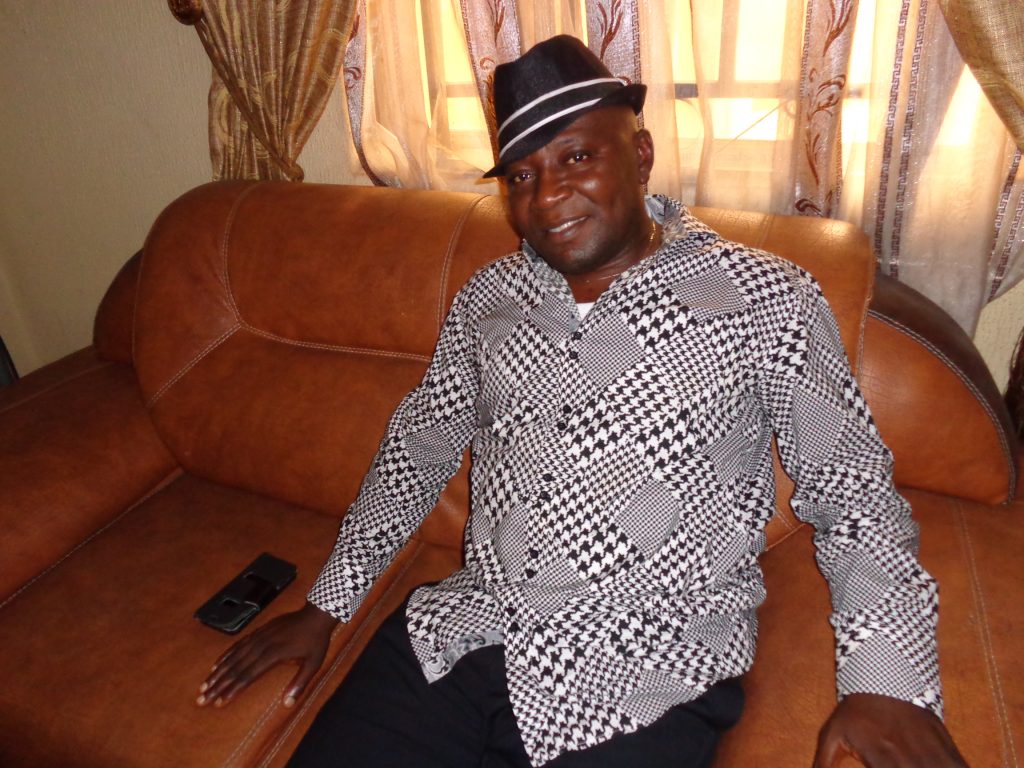
How far has your music taken you and how best will you describe it?
My music has taken me on a tour around Nigeria but yet to tour outside this shore. I’ve been to the northern, western Nigeria, not to talk of east where I am grandly established.
Talking of my style, it is my unique creativity that my fans love about my music, I don’t copy anybody. Unlike the younger musicians nowadays, copyright is the order of the day for them because they are lazy about creating things of their own. Sometimes, they copy and add a little thing here and there but in my case, I don’t copy instead people wait for me to release my song and they copy it.
If I have been copying others probably I might have been history by now but what has sustained my fans is my creativity. Once material is out with a new music, others swoop on it and it starts going viral. Again, fans love my music because of my originality.
When I started my music, it was Onitsha customs and traditions that I started with but when I saw the need for improvement and versatility so that my music could be widely accepted, I had to incorporate other cultural backgrounds too. I can authoritatively say that my music now appeals to everybody that understands Igbo language and culture.
What have been the challenges?
Though Piracy is a major challenge in the music industry so breaking even is quite tasking but for your music to be generally accepted, you must be out to create new things always because people love to hear new things. They don’t want to hear old or repeated stuff. You have to convince them that as a professional, you know your onus.
The challenge for me is to always prove to my fans that am equal to the task, this why I have to always create new stuffs.
As a beginner, there is bound to be the challenge of sponsorship.
When I started the challenge was the same but God helped me. At the initial stage, I used to hire instruments not until I was able to procure mine. You know that without your own equipment, you are not yet independent as a musician because you will have to depend on others and they may fail at anytime.
Though we faced these teething problems at the beginning, one was able to surmount them gradually. I am also grateful that things have been smooth so far between me and my band. We have regularly enjoyed cordial relationship because if I perhaps mismanage then, they are bound to leave.
How best will you analyze your music?
My music has both artistic and commercial value because whatsoever that is worth doing is worth doing well and one has to earn a living too.
My album is segmented between commercial, entertainment and artistic values. In an album of five tracks for instance, some track will be strictly produced for commercial purpose while others will be for artistic and entertainment. If the whole album becomes commercial, it won’t stand the test of time but when you combine all it becomes well balances.
To know the value of music is its ability to stand the test of time, even when the creator of the music is late, whenever the music is played, it will still remain evergreen.
What will you say about music administration in your domain?
I am the incumbent governor of the Anambra State chapter of Performing Musicians Association of Nigeria (PMAN) and the association has been faced with a lot of challenges in the past but when I saw the need for improvement, I decided to get involved in order to make impact and bring about tremendous change. When the opportunity presented itself, I vied for the post of the state chapter governor.
Though it is a common knowledge that the national level is engulfed in a game of wits that has eventually created factions but in the southeast we decided to work harmoniously and distance ourselves from the challenges that are currently rocking the apex of the association.
We decided to work together as one body in the whole of southeast, although there have been series of reconciliatory approaches aimed at resolving the crisis at the centre, we are hopeful that things will take better shape in due course.
What have you done towards moving things forward?
The southeast comprises; Abia, Anambra, Enugu, Ebonyi, and Imo states. Our aim is to keep ourselves together, working progressively while waiting for the centre to put their acts together. Immediately that is achieved, we will naturally team up in progress. The state chapter leaders are called governors while at the centre we have a president.
My objectives for vying for the post is to work for the harmonization of the music industry in Anambra State because there are musicians that plays gospel, hip-hop, reggae, highlife etc. My aim has always been that whatever style of music anyone plays there is need for everybody to come together under PMAN umbrella.
And in my tenure it has been achieve that all performing musician of whatever genre in Anambra State is now a card carrying member of PMAN.
We also intervene when there is crisis between a musician and marketer especially in helping to interpret musical contracts to some of our members lest they sign away their entire lives. We ensure that we enlighten them on whatever contracts they wish to sign, point out the gray areas before pen is put to paper.
Another thing that was not in place in the state which we have looked into is management and organizing of shows by corporate bodies. You cannot come into the state, recoup profits and go. There is need for artistes in the state to be involved in any kind of show that is organized by corporate bodies in any part of the state.
Though it exists at the national level but not in the state but recently we formed a committee that looked into the matter. We have started a tour of the relevant authorities in the state in order to intimate them of our aim before our task force becomes operational.
Soon corporate bodies will no longer organize shows in Anambra state, bring artistes from other places without involving musicians in the state. This is irrespective of whatever might be the status of the company or brand.
You can imagine for instance where there is a show organized for Ofala Festival and artistes are brought from Lagos, Port Harcourt and different other parts of the country without any indigenous artiste from Anambra State being involved, it is awkward.
As we have started looking into such cases, gladly there are positive responses from the people at the right quarters and soon it will be readdress.
What about artistes’ welfare?
Though the issue of welfare of artistes is paramount but it is beyond what the state chapter will handle, we are hopeful that by the time the crisis at the centre will be resolved such peculiar need will be looked into because it is necessary to have a kind of fund be it contributory pension that musicians too should be able to look forward to at their old ages or in time of incapacitation.
What is your level of involvement in politics?
Part of the reason why I remarked that I am a politician cum musician stems from the fact that I read political Science and after school, I contested for councillorship in 2004 which though was never conducted, I was later appointed the supervisor for works in Onitsha-North Local Government in 2005.
I served in that capacity till the end of my tenure, I was once again appointed supervisor for education in 2007 the same local government. I have always being in politics ever since.
What can you say about Onitsha culture?
Personally, I love the culture and the tradition of my people. I grew up within Onitsha so there is nothing about the culture that is strange to me. That is why I play traditional highlife music. I am in tune with the traditions of my people and it has helped in enriching my music.
There is no aspect of my activities that will make me lose focus of Onitsha because it has been my source and what brought me to limelight. My fans’ appreciating my music was because I started with Onitsha concept.
Onitsha though has been a pace-setter that is why people travel from far and wide to the city to learn some aspects of the cultures. I believe that through my music I have helped in showcasing the culture of Onitsha people in a way that will allow people easy access. I always projected the traditions in positive light.
Have you won any award?
I have won so many awards and the climax is winning the best highlife musician twice organized by City People Entertainment.
What do you feel about those that copy your music?
For those who play the copyright of music, I see it as a challenge for me to work harder. Most artistes that play my music see me as a role model and by doing that they in return promote my music.
When they perform my music, people will only be keen at knowing the originator of the music and on further enquiry it will be told that it is Ikem Mazeli’s music.
Also I am very happy for the young artistes because it brings to my consciousness that the industry is competitive and for me to stand the test of time, I have to step up my game. I encourage them a lot though but I am very glad that a lot of young people are now embracing music because it is lucrative.
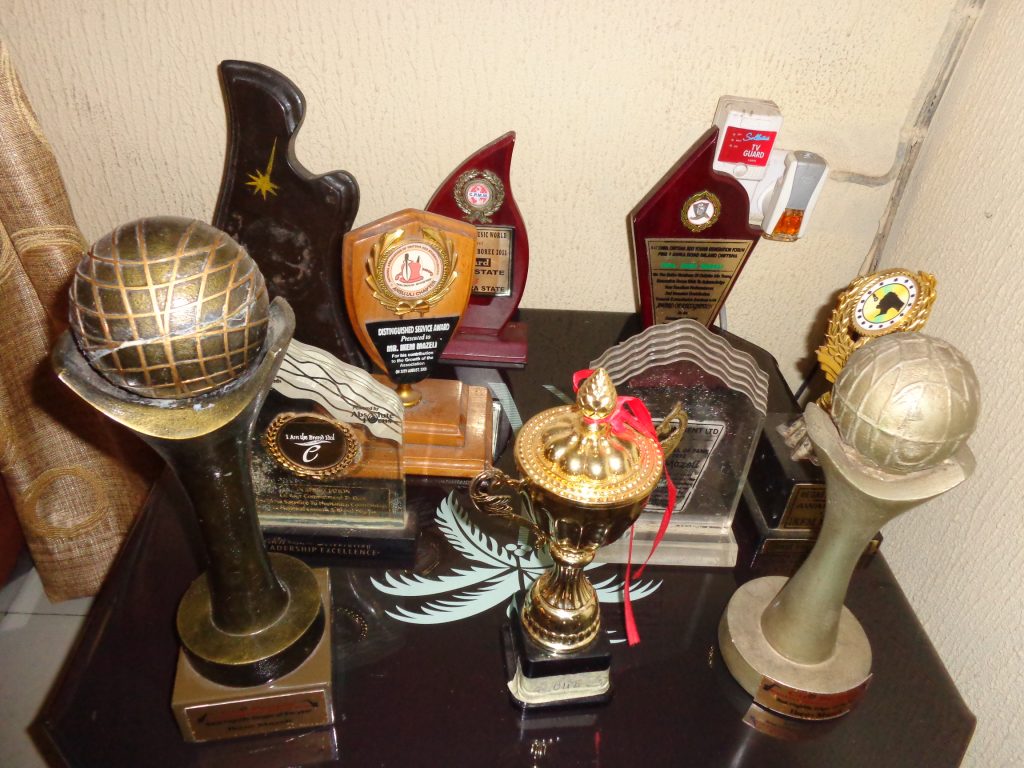
What is your advice?
Whether you are playing hip-hop, gospel or highlife music there is need for us to embrace unity because our job is to entertain people.
How do your relationship with your fans?
It is amusing because most times when people see me, they don’t recognize me as Ikem Mazeli because I look younger than my music and their expectation. Although I play traditional highlife, most time my dressing does not reflect traditional attire as people expect.
What is your dress sense?
I like to look simple and other times corporate even while on stage, except the show demands otherwise.
I prefer simple outlook and that is why when I meet some people, they mistake me for someone else because their mindset is to see a very elderly man behind the name and my rich lyrics.
Often time, it is until people introduce me before people recognize me in the public as Ikem Mazeli due to my dress sense.
Any attachment to any other accessory?
I love wearing fedora as part of my style.
Do you play any instrument?
Apart from flute, I play Set drums, and Conga perfectly and a bit of keyboard.
…Likes?
I like red and black colours.
I like rice and can eat it however it is prepared.
How have you managed female fans?
It is quite a huge challenge managing female fans, but one has to carry them along so as not to be termed arrogant or a snub. There is always a special way of treating them except for some that might try to act funny, at that stage the line has to be drawn.
Are you married?
I am married with five kids; a son and four daughters. My children are happy and doing well. My marriage is 15 years.
How will you fell if any of your children indicate interest in music?
If any of my children show interest in music, I will encourage the person. First I will ensure that the person is educated, though many are not aware that education helps a lot in the music industry. I believe that my rise and the impact I have made so far in the music industry has my education as a contributory factor.
What are your plans for your music and yours dreams?
I am not relenting, however, I see my present position as a stepping stone to where am going. I look forward to international tours and taking my music across the world. With the right contacts and exposure, I will be playing my music to the world. The most important thing I need now to move to the next level is hard work.
I look forward to being the next biggest representation of Igbo music and traditional highlife music worldwide because since the demise of prominent highlife musicians from the region that has taken the music of the region across the globe nobody has yet stepped in to continue from where they stopped.
When you go to the west, Sunny Ade and the likes are there making impact and when you go to the north, they have their representative but here is the east there is none, so I’m hopeful that soon they will hear my voice.
Any parting word?
I give God the glory that though I have not reached my destination, there is still room for improvement but I am contented nevertheless. I am still a work in progress. Till I get there, I am not relenting, I thank God.


